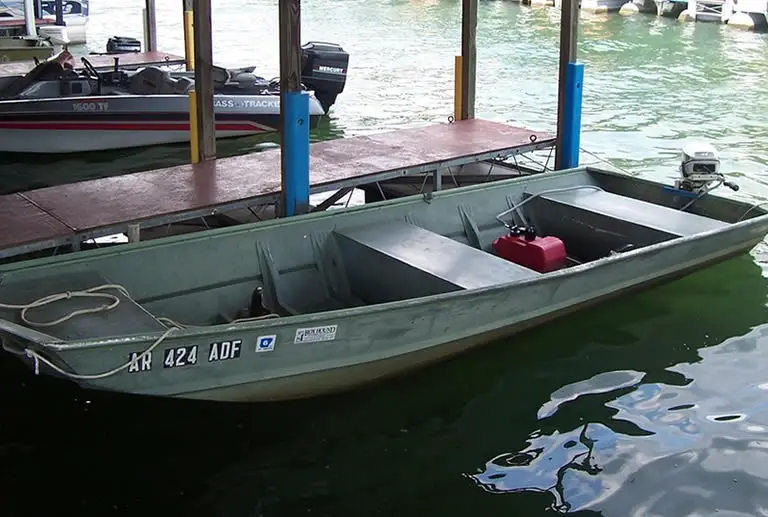I’m here to tell you that you can, as long as you take some simple precautions first.
Contents
Can You Use A Jon Boat In Saltwater?
Jon boats can go in saltwater as easily as they can go in fresh water but with one caveat.
A saltwater Jon boat will fair better when made of fiberglass or wooden Jon boats. These boats, due to their hull material will be more durable than an aluminum saltwater Jon boat.
You see, saltwater corrodes aluminum fast.
So, if you have an aluminum Jon boat which you intend to use in salt water environments then you will need to protect it with specialized products to minimize galvanic corrosion.
Although both freshwater and saltwater will eventually corrode any type of material some materials are more durable than others when it comes to saltwater.
How a wooden Jon boat can be used in saltwater
If you have a home-built Jon boat it will likely be made of some form of wood, such as the plywood Jon boat we showed readers how to build here. Obviously wood will degrade quickly in any sort of water if it is not properly protected. However, saltwater is no more corrosive to wood than freshwater is.
A wooden Jon boat will need no further protection against the effects of saltwater if it is already protected against the corrosive effects of freshwater.
If you have a wooden Jon boat it should already be protected with the appropriate type of paint, such as waterproof epoxy-based coatings, or a good coat of marine grade varnish. This will give your boat all the protection it needs against saltwater damage.
How a fiberglass Jon boat can be used in saltwater
Fiberglass Jon boats are rare. You don’t often see them on the water.
A fiberglass boat will the most durable type of boat used in a saltwater environment. However, if you own one you should still take steps to protect it from the abrasive nature of saltwater.
Good fiberglass one-part paints are usually polyurethane based and these can be manually applied by brush or roller or can be sprayed on.
Alternatively you could use a colored exterior gel coating instead of paint to ensure the fiberglass is well protected.
Why a metal Jon boat is not ideal for saltwater use
Almost all metal Jon boats are made from aluminum.
Aluminum is a very hard wearing, durable, lightweight and inexpensive metal. This makes it ideal for a boat.
Unfortunately, aluminum does not react well to salt water.
An aluminum Jon boat will corrode quickly in saltwater if it is not protected.
If you have an aluminum Jon boat you will need to take steps to protect your boat from saltwater.
Saltwater is highly corrosive to aluminum.
As I pointed out in this article the vast majority of Jon boats made in the USA and Canada are made from aluminum. So, the odds are your Jon boat is made from aluminum.
The following manufacturer’s Jon boats are all made from aluminum:
- Lund.
- Lowes.
- Tracker.
- Gator Trax.
- Alumacraft.
- Triton.
- Marine.
- Ranger.
If you followed our Jon boat buyer’s guide then you will most likely have bought a boat from one of the above mentioned manufacturers.
This means you have an aluminum Jon boat and will need to take steps to protect it if you want to use it in saltwater.
There is a process that occurs when aluminum and saltwater meet called galvanic corrosion.
Let’s take a look at this type of corrosion now and see what steps you can take to protect your boat should you desire to take it into saltwater.
Aluminum suffers from galvanic corrosion in salt water
Saltwater is an electrically conductive solution.
When a metal comes in contact with this solution it will give up some of its electrodes to another, but dissimilar, metal that is in the same solution. The effect of this is what we see as corrosion and decay.
Aluminum is very active chemically. This means it is very susceptible to galvanic corrosion when it is around most other metals. Don’t think that all you have to do is remove other types of metal from your boat. When aluminum is not in contact with another metal the corrosion will still occur but it will happen at a much slower rate.
I won’t bore you too much with the science behind galvanic corrosion, suffice it to say that this type of corrosion is electrical in nature, acts fast and has a devastating effect on an untreated aluminum boat.
So what can we do to protect our aluminum Jon boat from galvanic corrosion if we really want to use it in saltwater?
Two Ways To Protect Your Jon Boat From Corrosion In Saltwater
We will assume that you have an aluminum Jon boat from this point forward.
If you have a Jon made from a different material then simply follow the advice given in our article how to paint a Jon boat being sure to use the appropriate protective products for your given construction material. For everyone else, keep reading this article.
Many Jon boat owners think that merely applying bottom paint is enough to protect their boat from the corrosive effects of saltwater.
Although a good bottom paint is highly recommended just relying on that alone is a mistake.
The American Boat and Yacht Council (ABYC) recommends that “aluminum vessels shall have a protective paint coating that provides a high [electrical] resistance barrier between the aluminum and the water.”
So ordinary bottom paint isn’t enough. You need to take additional measures to protect your aluminum boat from electrical corrosion.
So how do we do that?
I’m glad you asked. Let’s take a look at how to protect your aluminum Jon now.
There are a number of steps you can take to protect your aluminum Jon boat from galvanic corrosion and we will look at them now.
To begin we see how the ABYC’s advice of applying electrical resistance paint can help protect the metal on your boat.
1. Aluminum boat paint provides a protective shell around the hull
A ordinary bottom paint is not enough to protect your aluminum Jon boat from galvanic corrosion. You should only use paint and coatings that are designed for use with aluminum.
Interlux and Pettit sell copper-free, aluminum-compatible paint systems. You can also get an excellent marine ablative antifouling bottom paint that is copper-free and will offer great galvanic corrosion protection as well as antifouling protection.
The above mentioned paints can be easily applied by brush, roller or spray gun and come with tech support and good instructions.
It does take some effort to get the application right if you are using paint but the results are well worth it.
You will need to set aside sufficient time for preparation and need to be patient in the application if you want to do it right though.
2. Zinc anodes can be sacrificed to prevent hull corrosion
A very popular method for protecting your aluminum Jon from galvanic corrosion is to attach Zinc Anodes.
As we mentioned previously, aluminum is very susceptible to galvanic corrosion when it is around most other metals but there are two exceptions that we can use to our advantage – zinc and magnesium!
So, using anodes made from zinc, and attaching them to your aluminum Jon boat, can help battle the damaging effects of galvanic corrosion.
How does this work?
Well, the zinc anodes are attached to your boat at points of saltwater contact, like the bottom of the hull, and then start to act as sacrificial metals that will corrode instead of your boat’s precious aluminum. T
his is why zinc anodes are often called sacrificial zinc anodes.
Zinc is not as chemically active as aluminum and can act as a form of protection for it.
By electrically connecting the zinc anodes to the aluminum of your boat the anodes will act as a “first layer” of protection.
The zinc will shed its electrodes first, stopping the aluminum from giving up its own.
The process of galvanic corrosion effectively corrodes the zinc before it gets to the aluminum.
The zinc anode is sacrificed to save the aluminum hull from corrosion.
As the zinc anodes become corroded they will need to be replaced or the corrosion will start working on the aluminum of your boat.
Don’t go gun-hoe and stick them everywhere as too many zinc anodes will cause the zinc to develop a crust which will cause the anodes to simply stop working.
If you plan to use paint as well as zinc anodes do not paint the anodes or grounding plates!
How to attach a hull zinc anode to the hull (video)
How to attach zinc anodes to the propeller shaft (video)
Attaching zinc anodes is not the only way to protect your aluminum boat from the corrosive effects of salt water.
There a variety of other ways to prevent corrosion on your aluminum boat.
Six Additional Steps To Prevent Galvanic Corrosion Across The Entire Boat
Below are some steps you can take to further prevent corrosion on your boat.
- Wash your boat thoroughly after you’ve used it in saltwater.
- Ensure even the smallest of cracks and scratches are repaired before use.
- Cover anything that exposes the bare aluminum with aluminum paint.
- Don’t use an automotive battery charger on the boat.
- Do not exceed 1,300 millivolts of impressed voltage when protecting the aluminum.
- Don’t use mixed metals on the boat.
You must protect the boat electrics too
It isn’t just the aluminum in your boat that is at risk from the corrosive effects of saltwater.
Be sure to protect your electrical wiring and fittings too with something like Corrosion X.
You can also use Corrosion X, or a similar product, to protect your fishing rods and other onboard metal-based accessories.

